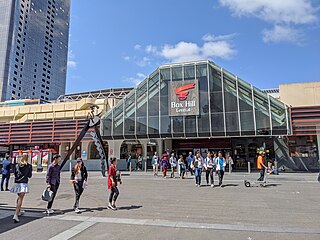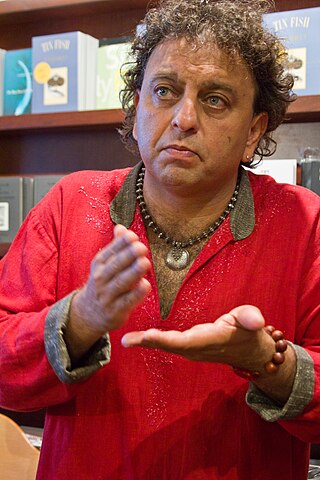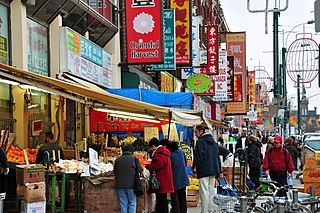
American Chinese cuisine is a cuisine derived from Chinese cuisine that was developed by Chinese Americans. The dishes served in many North American Chinese restaurants are adapted to American tastes and often differ significantly from those found in China.

The Lao people are a Tai ethnic group native to Southeast Asia, who speak the Lao language of the Kra–Dai languages. They are the majority ethnic group of Laos, making up 53.2% of the total population. The majority of Lao people adhere to Theravada Buddhism. They are closely related to other Tai people, especially with the Isan people, who are also speakers of Lao language, native to neighboring Thailand.

Thai Americans are Americans of Thai ancestry. The Thai American population is racially and ethnically diverse, consisting of many Thais who identify as mixed race and as Thai Chinese.

Buddhism is among the smallest minority-religions in Canada, with a very slowly growing population in the country, partly the result of conversion, with only 4.6% of new immigrants identifying themselves as Buddhist. As of 2021, the census recorded 356,975 or 0.8% of the population.

Vietnamese Canadians are Canadian citizens of Vietnamese ancestry. As of 2021, there are 275,530 Vietnamese Canadians, most of whom reside in the provinces of Ontario, British Columbia, Alberta, and Quebec.

Canadian Chinese cuisine is a cuisine derived from Chinese cuisine that was developed by Chinese Canadians. It was the first form of commercially available Chinese food in Canada. This cooking style was invented by early Cantonese immigrants who adapted traditional Chinese recipes to Western tastes and the available ingredients, and developed in a similar process to American Chinese cuisine.
Laotian Canadians, are Canadian citizens of Laotian origin or descent. In the 2016 Census, 24,580 people indicated Laotian ancestry. Bilateral relations between Canada and Laos were established in 1954 with the formalization of the independence of the Kingdom of Laos from France. In August 2015, Canada's first resident diplomat opened the Office of the Embassy of Canada in Vientiane, Laos.
Taiwanese Canadians are Canadians who carry full or partial ancestry from the East Asian country of Taiwan. There are over one hundred thousand Taiwanese who have gained citizenship or permanent residency status in Canada.

Asian Canadians are Canadians who were either born in or can trace their ancestry to the continent of Asia. Canadians with Asian ancestry comprise both the largest and fastest growing group in Canada, after European Canadians, forming approximately 20.2 percent of the Canadian population as of 2021. Most Asian Canadians are concentrated in the urban areas of Southern Ontario, Southwestern British Columbia, Central Alberta, and other large Canadian cities.

An ethnoburb is a suburban residential and business area with a notable cluster of a particular ethnic minority population. Although the group may not constitute the majority within the region, it is a significant amount of the population. That can greatly influence the social geography within the area because of cultural and religious traditional values exhibited. Ethnoburbs allow for ethnic minority groups to maintain their individual identity, but that may also restrict their ability to fully assimilate into mainstream culture and society.
Korean Canadians are Canadian citizens of full or partial Korean ancestry, as well with immigrants from North and South Korea. As of 2016, Korean Canadians are the 8th largest group of Asian Canadians.
Thais in the United Kingdom are British citizens who trace their Thai ancestry from migrants who have migrated from Thailand or Thais residing in the United Kingdom for work or educational purposes.

Indo-Canadians or Indian Canadians, are Canadians who have ancestry from India. The term East Indian is sometimes used to avoid confusion with the Indigenous peoples of Canada. Categorically, Indo-Canadians comprise a subgroup of South Asian Canadians which is a further subgroup of Asian Canadians. According to Statistics Canada, Indians are one of the fastest growing communities in Canada and one of the largest non-European ethnic groups.
The Jodo Shinshu Buddhist Temples of Canada are a group of temples and fellowships that are affiliated with the Nishi Hongan-ji of Kyoto, Japan, the mother temple of the Jodo Shinshu sect of Buddhism.

Tamil Canadians, or Canadian Tamils, are Canadians of Tamil ethno-linguistic origin. Much of Canada's Tamil diaspora from India and Sri Lanka then majority consist of Sri Lankan Tamil refugees who sought to flee the ethnic tensions during the Sri Lankan Civil War between the 1970s and 2000s, while economic Tamil migrants also originate from India, Singapore and other parts of South Asia.

Vikram Vij is an Indian-born Canadian chef, cookbook author, and television personality. He is co-owner, with his ex-wife Meeru Dhalwala, of the Indian cuisine restaurants Vij's Restaurant and Rangoli Restaurant in Vancouver, British Columbia. He also owns My Shanti, a restaurant in South Surrey, BC. In 2014, Vij was announced as a new "dragon" investor on the Canadian reality show Dragons' Den for its ninth season and departed at the end of the season.

The Chinese Canadian community in the Greater Toronto Area was first established around 1877, with an initial population of two laundry owners. While the Chinese Canadian population was initially small in size, it dramatically grew beginning in the late 1960s due to changes in immigration law and political issues in Hong Kong. Additional immigration from Southeast Asia in the aftermath of the Vietnam War and related conflicts and a late 20th century wave of Hong Kong immigration led to the further development of Chinese ethnic enclaves in the Greater Toronto Area. The Chinese established many large shopping centres in suburban areas catering to their ethnic group. There are 679,725 Chinese in the Greater Toronto Area as of the 2021 census, second only to New York City for largest Chinese community in North America.
Toronto has a significant population of Vietnamese Canadians. Toronto is about 1.5% Vietnamese.
Chinese Canadians are a sizable part of the population in Greater Vancouver, especially in the Chinese communities in the city of Vancouver and the adjoining suburban city of Richmond. The legacy of Chinese immigration is prevalent throughout the Vancouver area.

Amanda Charlene Obdam is a Thai-Canadian actress, model and beauty pageant titleholder who was crowned Miss Universe Thailand 2020. She represented Thailand at the Miss Universe 2020 pageant in Hollywood, Florida where she finished as a Top 10 semifinalist.













